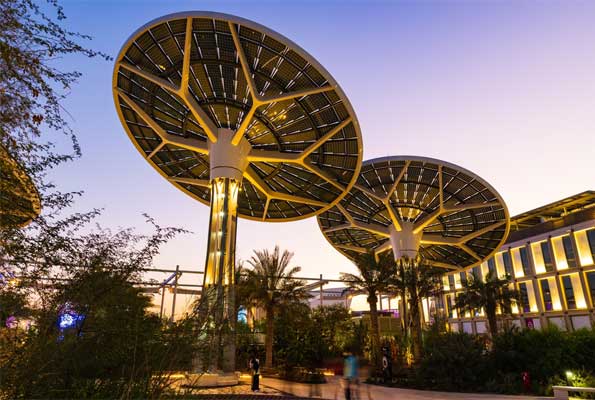To create a national system for carbon credits utilizing blockchain technology, the Ministry of Climate Change and Environment has signed a preliminary deal with the UAE-based Industrial Innovation Group (IIG) and Venom Foundation.
According to a ministry statement, the agreement, reached in the lead-up to the Cop28 climate summit in Dubai in November and December 2023, is consistent with the UAE’s stronger carbon emissions reduction targets this decade and reaching its goal of climate neutrality by 2050.
The partnership aims to improve sustainable agriculture, environmental health, and biodiversity in the UAE while lowering emissions.
The parties intend to create a system that will enable the highest levels of “transparency, reliability, efficiency, and security” in the administration, issuance, transfer, calculation, and precise tracking of carbon credits.
According to Mariam Al Mheiri, Minister of Climate Change and Environment, “The UAE believes in its ability to make a difference in this field and has pledged, through the third update of its second Nationally Determined Contributions, to reduce its emissions by 40% [this decade] compared to a business-as-usual scenario.”
“This requires working according to a scientific approach based on modern technology and the highest levels of transparency to monitor carbon credits to work according to realistic data, achieve tangible results on the ground, and achieve climate neutrality by 2050,” she added further.
According to the minister, the agreement between IIG and Venom for the national system of carbon credits is an “important step” that demonstrates the UAE’s commitment to accelerating climate action “for a more sustainable future for us and future generations.”
Permits that allow businesses to emit a specific amount of carbon dioxide or other greenhouse gases are known as ‘Carbon Credits’, commonly referred to as carbon offsets. Projects to combat climate change that would not otherwise be funded are then funded using the money raised from the sale of the credits.
According to consulting company McKinsey, the market for the financial instrument might be valued at over USD 50 billion by 2030.
Blockchain is a distributed, unchangeable ledger that can be used to track assets and record transactions. Secure online wallets, several other payment-related enterprises, and cryptocurrencies are all supported by technology.
According to Edward Bell, senior director of market economics at Emirates NBD, the usage of blockchain in the carbon credit system could help to improve the “traceability of specific carbon credits and reduce the risk of double counting of a single credit.”
The UAE, the second-largest economy in the Arab world, is creating its carbon market, a trading system in which the credits are purchased and sold, much like its regional counterparts.
The UAE Independent Climate Change Accelerators (UICCA) introduced the UAE Carbon Alliance in June 2023 as a new alliance that will support the transition of businesses to a green economy and assist in the creation of a carbon market in the Emirates.
AirCarbon Exchange (ACX), First Abu Dhabi Bank, Mubadala Investment Company, Abu Dhabi National Energy Company, Abu Dhabi Future Energy Company, and UICCA are the founding members of the alliance.
The UAE capital’s financial free zone, ‘The Abu Dhabi Global Market’, announced in 2022 the ambitions of collaborating with ACX to establish the “world’s first fully regulated” carbon trading exchange and clearing house in the emirate.
Additionally, the UAE is spending a lot of money on sustainable energy projects including the Mohammed bin Rashid Al Maktoum Solar Park in Dubai, the Barakah Nuclear Power Plant in Abu Dhabi, and a two-gigawatt solar plant in the Al Dhafra neighbourhood.
The ‘National Hydrogen Strategy’ was also approved by the cabinet in July 2023, along with an updated version of the ‘UAE Energy Strategy 2050’.
The UAE will invest Dh200 billion (USD 54 billion) by 2030 following the strategy’s amended goals to meet energy demand while sustaining economic growth.
The ministry claimed that its most recent agreement was concentrated on strategic goals of lowering greenhouse gas emissions to achieve climate neutrality and growing agribusiness.
Additionally, it emphasizes encouraging ethical investment in sustainable food systems and agriculture.
The parties will work together to develop technology tools for a global platform for registering and issuing carbon credits in the United Arab Emirates, as well as for offering a blockchain-based tool for managing the national system securely and efficiently.
A “legislative and regulatory framework by the ministry to establish the national system for carbon credits” is another goal of the collaboration.
It can help to establish reporting criteria for emissions among local corporations that can then utilize the credit system by putting up a domestic registry for carbon credits in the UAE, according to Mr. Bell.
“Local corporates are likely to have a more direct connection to the impact on their home market if the credits are used to support projects in the UAE,” the official commented further.
According to the ministry, the preliminary agreement also addresses topics including strengthening collaboration prospects with the commercial sector, climate change adaptation, developing and establishing a climate neutrality strategy, and green investment.



